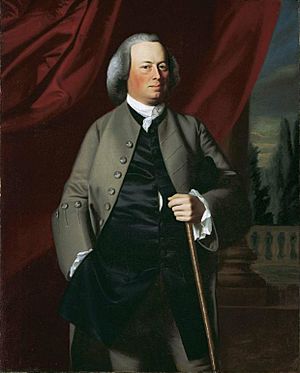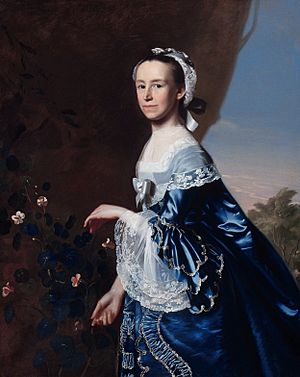James Warren (politician) facts for kids
Quick facts for kids
James Warren
|
|
|---|---|
 |
|
| President of the Massachusetts Provincial Congress | |
| In office June 18, 1775 – October 25, 1789 |
|
| Preceded by | Joseph Warren |
| Succeeded by | Caleb Davis (as Speaker) |
| Speaker of the Massachusetts House of Representatives | |
| In office 1787–1788 |
|
| Preceded by | Artemas Ward |
| Succeeded by | Theodore Sedgwick |
| Personal details | |
| Born | September 28, 1726 Plymouth, Massachusetts |
| Died | November 28, 1808 (aged 82) Plymouth, Massachusetts |
| Spouse | |
| Children | 5 |
| Military service | |
| Allegiance | (1775–1781) |
| Branch/service | (1775–1776) |
| Rank | Major-General |
| Battles/wars | |
James Warren (born September 28, 1726 – died November 28, 1808) was an important American leader. He was a merchant, a politician, and a military officer. He is best known for being the speaker of the Massachusetts House of Representatives from 1787 to 1788.
Warren strongly supported the American colonies' fight against British rule. He helped lead the resistance to unfair British laws during the American Revolution. During the American Revolutionary War, he served as the Continental Army's Paymaster-General. After the war, he continued his career in politics.
James Warren was born in Plymouth, Massachusetts. His family was wealthy and well-known in New England. He studied at Harvard College from 1745 to 1747. After college, he returned to Plymouth to work as a businessman and a gentleman farmer. In 1754, he married Mercy Otis. She shared his strong belief in republican ideals. They had five sons together. In 1766, Warren was elected to the Massachusetts House of Representatives. He served there until 1778.
As tensions grew between Great Britain and its American colonies, Warren became a key supporter of the Patriot cause. He helped create a committee of correspondence in Massachusetts. This group helped spread news and coordinate actions among the colonies. Warren was a delegate to the first Massachusetts Provincial Congress in October 1774. He also became president of the third Provincial Congress from 1775 to 1780. This happened after his friend, Joseph Warren, was killed at the Battle of Bunker Hill.
During the Revolutionary War, Warren held many important jobs. Besides being Paymaster-General, he was also on the naval board for the Continental Navy from 1776 to 1781. He also served as a general officer in the Massachusetts Militia for a year. He resigned from the militia in 1777. After the war, Warren was elected as a speaker in the Massachusetts General Court in 1787. He retired from politics in 1794 and passed away in Plymouth fourteen years later.
Contents
Early Life and Family
James Warren was born on September 28, 1726, in Plymouth, Massachusetts. His father, also named James Warren, was a businessman and a legal official. He served as the high sheriff of Plymouth County. His father was also a captain in the provincial militia. Warren's mother was Penelope Winslow. She married his father in 1724. The Warren family was very well-known in New England. They were descendants of Richard Warren, a passenger on the Mayflower ship.
Young James grew up on the family farm, which was near the Eel River. In 1742, he began attending Harvard College. He graduated in 1745 with a BA degree. While at Harvard, Warren was an excellent student. He developed strong ideas about how the colonies should be governed. He also became friends with James Otis Sr., who later became a soldier and the Massachusetts Attorney General.
After graduating from Harvard, Warren returned to Plymouth. He started a career as a merchant and a gentleman farmer. On November 14, 1754, Warren married 26-year-old Mercy Otis. She was the only daughter of James Otis Sr. They had been engaged for six years before marrying. After their wedding at the Otis family home, they moved to a homestead in Plymouth that Warren had bought in 1755.
Role in the American Revolution
In 1757, after his father passed away, James Warren took over his father's job as the high sheriff of Plymouth County. Warren and Mercy moved back to his family's estate that same year. There, Mercy gave birth to their first son, whom they named James. This period was a time of growing tension between Great Britain and its North American colonies. Colonists were protesting several unpopular laws passed by the British Parliament.
In 1765, a small group of American Patriots, including Warren, met at his family home. They discussed how the colonies should respond to the Stamp Act. This act was passed by the British Parliament to raise taxes from the Thirteen Colonies. The group decided that representatives from each of the Thirteen Colonies should meet in New York City. They planned to write a petition to King George III asking him to cancel the act.
While the colonists waited for the King's response, Warren was elected to the Massachusetts House of Representatives in 1766. He served in this role until 1778. During this time, he became friends with important Patriots like James Otis Jr., John Adams, and Samuel Adams. In 1772, Warren, along with Mercy, John Adams, and Joseph Warren, helped form a Massachusetts committee of correspondence. This was in response to the Gaspee Affair.
Warren continued to be involved in resisting British laws that targeted the colonies. He played important roles in political protests by Patriots, such as the Boston Tea Party. He wrote that "the People should strike some bold stroke and try the Issue." In a letter to John Adams in 1775, Warren said, "I am content to move in a small sphere. I expect no distinction but that of an honest man who has exerted every nerve."
In October 1774, Warren was a delegate to the first Massachusetts Provincial Congress. Open fighting began between British and Patriot forces in 1775 after the battles of Lexington and Concord. On June 17, after Joseph Warren was killed fighting British Army forces at the battle of Bunker Hill, James Warren took his place. He became president of the Massachusetts Provincial Congress and held that position until the congress ended in 1780.
Revolutionary War Service and Later Life
During the early part of the American Revolutionary War, James Warren served as Paymaster-General of the Continental Army. He held this job from July 27, 1775, to April 19, 1776. The Continental Congress appointed him to this position. For his work, Warren was paid 100 dollars a month. He also served as a military officer in the Continental Army. This was when they were stationed at Cambridge and Boston in 1775 and 1776. During this campaign, Patriot troops successfully forced British forces to leave Massachusetts.
From 1776 to 1781, Warren was part of the Eastern Department of the Continental Navy Board. He helped oversee the new Continental Navy as it fought against Royal Navy warships in North America. Warren was also made a major-general in the Massachusetts militia. He was ordered to lead a Continental Army force into British-controlled areas in Rhode Island. However, Warren did not want to serve under an officer of a lower rank. So, he officially resigned from the militia in August 1777. This ended his military career.
In 1783, the British Crown signed the Treaty of Paris. This treaty officially recognized the United States' independence. Four years later, in 1787, Warren was elected "by the popular majority" to be the speaker of the Massachusetts House of Representatives. During his one-year term, Warren's popularity decreased. This was because of his views on money issues and his criticism of how the federal authorities handled Shays' Rebellion. On October 22, 1786, Warren wrote to John Adams that "We are now in a State of Anarchy and Confusion bordering on a Civil War."
Rumors spread that the Warren family had supported the rebels after the rebellion was put down. They had to deny these rumors. They also denied claims that their son Winslow had joined forces with rebel leader Daniel Shays. Relations between the federal government and the Warrens became difficult during this time. When Winslow's request to be the American consul in Lisbon, Portugal was turned down, Warren and Mercy wrote a letter together. They attacked governor of Massachusetts James Bowdoin for not supporting Winslow.
In 1788, Warren became a leading opponent of the Constitution of the United States being approved. He was concerned because the document did not include a bill of rights. He wrote several pamphlets published in Boston to raise awareness about this issue. He also wrote articles for newspapers like the Independent Chronicle and the Massachusetts Centinel. Warren was chosen to serve on the governor's council from 1792 to 1794. However, he lost when he ran for lieutenant governor. He retired in 1794 and returned to his Plymouth estate. He passed away there on November 27, 1808.
Personal Life and Beliefs
Throughout their lives, James and Mercy Warren were strong supporters of American republicanism. Historian Murney Gerlach noted that Warren remained a "firm exponent of republicanism." He believed in a political system based on "equal liberty and the happiness of mankind." The couple promoted strong ideas of U.S. republicanism. They continued to do so even when these views became less popular after the Revolutionary War.
Warren was a founding member of the American Academy of Arts and Sciences. This is one of the oldest learned societies in the United States. However, Warren later faced criticism from other members of the academy. This was because of his views on Shays' Rebellion. Unlike most academy members, Warren felt sympathy for the rebels' complaints against the federal government. This was in line with his political belief of being "suspicious of incipient despotism" (meaning, suspicious of new forms of unfair rule). Mercy wrote that Warren handled "unprovoked abuse with the Dignity of conscious rectitude."
In the 1790s, Warren sided with the Jeffersonian democrats. This caused his friendship with John Adams to become strained. American statesman John Quincy Adams observed that Warren "was formerly a very popular man, but of late years he has thought himself neglected by the people. His mind has been soured, and he became discontented and querulous." In 1804, Warren was chosen to be a presidential elector for Massachusetts. He voted for Thomas Jefferson in the 1804 United States presidential election against Southern politician Charles Cotesworth Pinckney.
During their marriage, Warren had a strong relationship with his wife. He encouraged her career as a playwright. He treated Mercy as an intellectual equal and a trusted friend. After Mercy gave birth to James in 1757, the couple had four more children over the next nine years: Winslow, Charles, Henry, and George. After Warren's death, he was buried at Burial Hill, a cemetery in Plymouth. Mercy used this time to try to fix her difficult relationship with John Adams. Mercy died on October 19, 1814, at the age of 86. She was also buried at Burial Hill.
 | Laphonza Butler |
 | Daisy Bates |
 | Elizabeth Piper Ensley |


